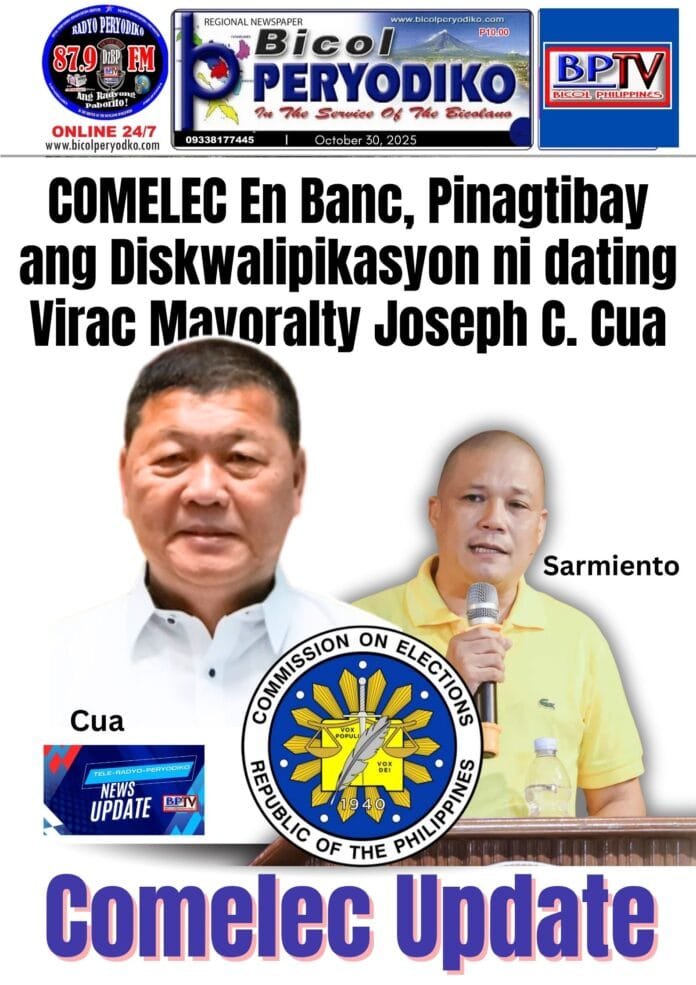The Commission on Elections (COMELEC) En Banc has affirmed the disqualification of former Virac Mayoralty Joseph Chua Cua from the May 12, 2025 National and Local Elections, denying his Motion for Reconsideration against the earlier ruling of the Commission’s First Division that found him ineligible to run due to citizenship and residency issues.
In a 10-page resolution promulgated on October 29, 2025, the En Banc upheld the July 11, 2025 decision of the First Division that granted the petition for disqualification filed by Sinforoso M. Sarmiento Jr., Cua’s political rival, citing inconsistencies in Cua’s documents and doubts surrounding his Filipino citizenship.
The First Division earlier ruled that Cua’s naturalization and identification certificates carried questionable authenticity and that his birth certificate—which still indicated Chinese citizenship—remained unrectified despite changes in his surname through court proceedings. The Commission also noted the “mathematical impossibility” of his claimed 61 years and six months of residence in Virac, considering his prior tenure as mayor of San Andres, Catanduanes from 2001 to 2004.
The En Banc emphasized that a birth certificate is a primary public record that carries a strong presumption of truth, adding that Cua failed to present credible proof to overcome that presumption. The Commission also questioned the discrepancy between the names appearing in his naturalization and identification certificates—“Joseph Chua Cua”—and the name on his birth certificate—“Joseph Qua.”
“Reliance on the birth certificate, therefore, is reasonable and warranted,” the En Banc stated, adding that the probative value of Cua’s other documents was “insubstantial and doubtful.”
While acknowledging that the case was technically moot and academic—since Cua lost to Sarmiento in the 2025 mayoral race—the COMELEC still chose to resolve the issue “in the interest of strong public interest” and to provide guidance on recurring questions regarding qualifications and citizenship of candidates.
COMELEC underscored that issues of citizenship and eligibility fall squarely within its jurisdiction, and the ruling was not a collateral attack on Cua’s citizenship but a legitimate inquiry into his qualifications to run for public office.
In his motion, Cua argued that his certificate of naturalization and identification certificates were valid public documents entitled to the presumption of regularity, and that his one-year absence abroad did not affect his residency status. He also cited the issuance of a Philippine passport as proof of citizenship.
However, the Commission rejected these claims, pointing out that the issuance of a passport does not override the citizenship reflected in one’s birth certificate, particularly since Cua’s passport was issued in 2018 under the rules of Republic Act 8239 (Philippine Passport Act), which requires submission of a birth certificate.
“In the absence of any showing that the assailed Resolution suffers from infirmities that would justify reconsideration, this Commission finds no cogent reason to disturb the findings of the First Division,” the COMELEC En Banc ruled.
The Resolution of the First Division is affirmed, and Joseph Chua Cua remains disqualified as a candidate for Mayor of Virac, Catanduanes.
Cua, a long-time political figure in Catanduanes, previously served as Governor and Mayor of San Andres. His disqualification case was initiated by Sarmiento, who contested Cua’s citizenship, residency, and eligibility to run for public office.
The ruling effectively ends Cua’s legal bid to overturn his disqualification and underscores COMELEC’s position that only duly qualified Filipino citizens can seek election to local government posts. Meanwhile, Cua’s camp may still elevate the case to the Supreme Court to determine whether the COMELEC exceeded its authority or acted without jurisdiction.| Francis Benedict | Bicol/Radyo Peryodiko




















